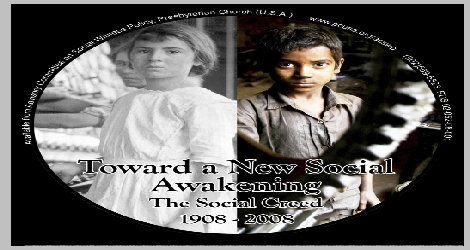[wpcol_1half id=”” class=”” style=””]
More than Just the Minimum: Creative Work for Change
There are good examples of both businesses and Christian communities who are doing much to value workers and to practice an ethic of generosity. Seven years ago Malden Mills, manufacturer of Polartec and Polarfleece fabrics, was destroyed by fire. Rather than moving the mill overseas, CEO Aaron Feuerstein rebuilt in the same location in Massachusetts and paid his workers as the mill was being rebuilt. A devout Jew, Feuerstein commented to reporters that “I have a responsibility to the worker both blue-collar and white-collar … I have an equal responsibility to the community.”[14] COSTCO offers another good example. It is often assumed that businesses, especially discounters, simply can’t afford to pay fair wages. However, COSTCO, a discount retailer, pays workers an average of $17.00 an hour with benefits. Sol Price, the owner of COSTCO, rejects the notion that discounters can only profit by giving their employees short shrift.
Some Christians, like those at Koinonia Farms, distance themselves from dominant social and economic structures to witness to a different way of life. Other Christian communities participate in our shared economic structures and push them from within. Religious communities and labor unions have worked together to advance living wage laws across the country. The idea behind the living wage is that full-time workers will be paid enough so that they won’t have to depend upon government assistant programs such as Medicaid and food stamps. In the late 1980’s, Madison Avenue Presbyterian Church cooperated with other church-supported groups, religious people working in soup kitchens and homeless shelters, workers, and union organizers to form a coalition that backed a living wage campaign in Baltimore. The city had poured thousands of dollars into urban renewal by giving tax incentives to businesses, but the businesses primarily created low-wage jobs. Together, their coalition applied pressure on the local governance until in December 1994 Kurt Schmoke, Mayor of Baltimore at that time, agreed to sign the “Social Compact” that they had proposed. The “Social Compact” included raising the minimum wage to $6.10 an hour with an increase over time to $7.70 an hour and recognizing the workers’ negotiating organization, The Solidarity Committee.[15]
[/wpcol_1half] [wpcol_1half_end id=”” class=”” style=””]
We have so much to gain by attending to the social and economic structures which are creating an ever-widening divide between rich and the poor. Imagine how the lives of workers and their families would improve. The call to Christians today is to challenge assumptions that place the burden of the responsibility for poverty upon the shoulders of individuals alone. We must confront the notion that the market itself has the ability to fairly determine wages and cannot be changed. We should challenge tremendous economic disparities between the salaries of those at the top of the company ladder and those at the bottom. Our call is to speak the truth about policies that will ensure that all workers are paid enough so that they can satisfy their own basic needs as well as the needs of their families. Policies should be changed even when it means that we have to take economic risks of our own and transform the systems which have created such inequalities. Workers should be valued not only because of what they contribute to our common life through their work but because they are valued by God.
The prophet Isaiah speaks about God’s vision for a world where God’s people will not “build and another inhabit; they shall not plant and another eat; for like the days of a tree shall the days of my people be, and my chosen shall long enjoy the work of their hands. They shall not labor in vain …” (Isaiah 65: 21-22). I cannot help but think that this is God’s vision for all people today.
[/wpcol_1half_end]
Dr. Elizabeth Hinson-Hasty is an associate professor of theology at Bellarmine and an ordained minister in the Presbyterian Church (USA). She is the author of Beyond the Social Maze: Exploring Vida Dutton Scudder’s Theological Ethics, and co-editor of two books, Prayers for the New Social Awakening, with Christian Iosso, and To Do Justice: A Guide for Progressive Christians, with Rebecca Todd Peters. Hinson-Hasty has been honored to receive a Fulbright Grant (Hungary 2010), the Wilson Wyatt Fellowship for Excellence in Teaching and Scholarship (2010), a Bellarmine “Bellie” for Faith and Reason (2010), and a Kentuckiana Metroversity Instructional Development Award (2008).
Notes
[1] See the 2010 CIA World Factbook. Available at www.cia.gov.
[2] See Michael Norton and Dan Ariely, “Building a Better America—One Wealth Quintile at a Time.” Perspectives on Psychological Science 6 (1): 912.
[3] The federal minimum wage increased to $7.25 in 2009; those working full-time for fifty-two weeks a year earn $15,080 before taxes. Some states, such as Alaska, Arizona, California, Colorado, Connecticut, D.C., Florida, Illinois, Maine, Massachusetts, Michigan, Montana, New Mexico, Nevada, Ohio, Oregon, Rhode Island, Vermont, and Washington, have a higher minimum wage. Minnesota’s minimum wage is lower than the federal minimum wage. See “State Minimum Wage Rates” at http://www.laborlawcenter.com/t-State-Minimum-Wage-Rates.aspx.
[4] The 2011 Federal Poverty Guideline is $10,890 for a single person. See the 2011 HHS Federal Poverty Guidelines at http://aspe.hhs.gov/poverty/11poverty.shtml.
[5] EPI has continued studying poverty and the state of the working poor in the United States. For more recent data go to their website and examine current trends. See http://www.stateofworkingamerica.org/charts/subject/8.
[6] In 2011, a family of four with an income of $22,350 is considered to be living in poverty. See http://aspe.hhs.gov/poverty/11poverty.shtml.
[7] Richard B. Freeman, “Solving the New Inequality.” Boston Review December 1996/January 1997.
[8] Ibid.
[9] James Galbraith, Created Unequal. Chicago: The University of Chicago Press, 266.
[10] Nelson Lichtenstein, “Wal-Mart: A Template for Twenty-First-Century Capitalism,” in Wal-Mart the face of Twenty-First-Century Capitalism, edited by Lichtenstein (New York: The New Press, 2006), 4.
[11] Ibid, 27.
[12] Peter S. Goodman and Philip P. Pan, “Chinese Workers Pay for Wal-Mart’s Low Prices: Retailer Squeezes it Asian Supplier to Cut Costs,” The Washington Post Sunday, February 8, 2004: A01.
[13] The average Walmart worker’s wage may have increased in the last three years, but the disparities still exist. ABC news ran a story on July 2, 2010 about Walmart worker pay. Ed Smith, a Chicago city alderman, had converted CEO Michael Duke’s salary of $35 million to an hourly wage of $16,826.92. If hourly workers in 2010 were hired at $8.75 an hour they would make about $13,650 a year before taxes. See Alice Gomstyn, “Walmart CEO Pay: More in an Hour than Workers get all Year?”Available online at http://abcnews.go.com/Business/walmart-ceo-pay-hour-workers-year/story?id=11067470.
[14] Avi Shafron, “Aaron Feuerstein: Bankrupt and Wealthy,” http://www.aish.com/societyWork/work/Aaron_Feuerstein_Bankrupt_and__Wealthy.asp.
[15] Nile Harper, Urban Churches, Vital Signs: Beyond Charity Toward Justice (Grand Rapids: Wm. B. Eerdmans Publishing, Co., 1999).





Unbound Social